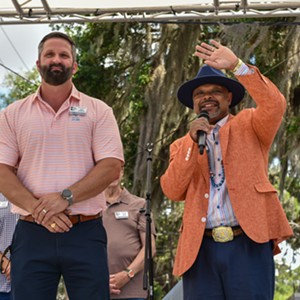AFTER THE recent city elections — the results of which, let’s just say, didn’t completely satisfy everyone — I kept hearing this comment: “The people have spoken. It’s time for everybody to just accept the results and move on.”
Well... of course the people have spoken. Has anyone actually said that we shouldn’t accept the results? I don’t know anyone who has suggested such a thing.
We may not all like the results, but there’s a difference between not liking them and not accepting them.
As far as moving on: You mean preparing for the next election, as the victors of these elections will begin doing about five minutes after they’re sworn in?
OK, if you insist.
That said: Whoever decided to schedule most U.S. elections just before Christmas was very wise. The season of good cheer is just what the doctor ordered to relieve lingering bitterness and dissatisfaction and start the new year off with a sense of optimism for the future.
With that in mind — and with a nod to those who think I’m too negative and cynical on this page — here’s my Holiday Party of Positive Post-Election Feelings, in which I detail some of the lesser–noted good things that came out of this election:
• Bill Gillespie: He didn’t win in his bid for alderman–at–large. But Gillespie consistently impressed debate audiences with his knowledge of the issues, his obvious non–politician earnestness, and the fact that he had no agenda other than making Savannah a better place in which to live.
Despite not making the runoff between Tom Bordeaux and Clinton Young, I believe Bill substantially lifted the debate and made both those candidates better. Hopefully Bordeaux, the eventual winner, will take to heart Gillespie’s earnestness and eschew the tools of the career politician that Bordeaux essentially is.
Plus: I adopted a beautiful if occasionally annoying cat from Bill, a devoted animal–lover, and so he’s always OK in my book.
• Ruel Joyner: Nope, Ruel didn’t win either. Truth be told, he didn’t come close to defeating Van Johnson for First District alderman. But he became the go–to vector for the local throw–the–bums–out movement, and in so doing, underwent a substantial personal transformation in the process.
During one conversation I had with him in the middle of the campaign, he said, “Jim, I thought I had a master’s degree in Savannah, but it turns out I only have an associate’s.”
Indeed, Savannah can be a strange and humbling place even for natives such as Ruel and me. It’s good to see he has the capacity and maturity for positive personal change in the face of adversity.
Given that Joyner’s not going away anytime soon — he’s a key business owner on Broughton Street and current president of the Downtown Business Association — we’re better off with him in the mix, whether on City Council or not.
• Edna Jackson: While there’s no question that “the people have spoken” in electing Edna Jackson the next mayor of Savannah, she cannot claim an overwhelming mandate. She got only 36 percent of the vote in the six–way general election, which I thought was a low number given that she was considered a shoo–in as recently as a year ago.
While she clearly bested Jeff Felser in the mayoral runoff, the final vote percentage — 57 for her, 43 for him — was uncomfortably close to the exact black/white percentage split in the City of Savannah’s population, which doesn’t necessarily bode well moving forward.
However, Jackson’s pleasant demeanor and steadfast dedication to running a dirt–free campaign do indeed bode well. I’m sure I’m not the only Savannah voter relieved to know we’ll soon be free of the ongoing spectacle of Otis Johnson condescendingly dismissing the point of view of a fellow taxpayer who had the gall to request a brief appearance before his imperial city council.
There’s a school of thought that says the local business community supported Jackson because they’re under the impression she’s easily manipulated and has few ideas of her own. If they really think that, they’re probably in for a disappointment.
Political history is rife with examples of candidates who rose to the occasion and found their true voices once elected to an office of real responsibility. I think Jackson could be that kind of candidate.
• Real talk: With this election, African-American political power in Savannah is now completely consolidated. There’s a 6–3 African-American majority on city council, and African-Americans occupy pretty much every key position in city government with the exception of city attorney — and James Blackburn will likely retire soon.
(For those of you annoyed by my frequent mention of race in connection with local politics: Welcome to Savannah! I hope you stay awhile. And don’t shoot the messenger — he’s just telling you how it is.)
Crucially and happily, this means no more close 5–4 votes “breaking down along racial lines,” as the sadly familiar phrase goes from local media reports.
And as we’ve seen with their enthusiastic backing of Mayor-elect Jackson, the local white establishment is all–in this time.
Perhaps some of the tired and counterproductive ‘60s rhetoric of grievance which has driven so much local politics will be dialed back in favor of a more self-confident and proactive leadership which fully owns its considerable — and yes, fully accepted — political power.































